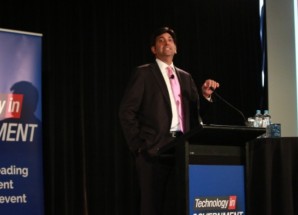The man appointed by US President Barack Obama as the first Chief Technology Officer of the United States Government has issued a stinging critique of how entrenched and inflexible procurement practices work directly against public sector innovation and better services for the community.
Speaking at the Technology In Government Summit in Canberra on Tuesday, Aneesh Chopra, who left the White House in 2012 and has since stood as a candidate in Virginia, argued that governments need to find “a third way” to tackle public policy and service delivery problems by issuing competition challenges and awarding prizes outside traditional buying channels.
This included reaching out to parts of the entrepreneur and technology community that would not ordinarily consider bidding for government work or projects in order to bring in fresh thinking that has made successes out of digital start-ups companies like Uber.
Instead of seeking a specified product or service, Mr Chopra said governments ought to ask businesses for their ideas on the best way to solve a problem to open-up an otherwise restricted playing field.
He said the US was now pursuing alternatives to procurement staples like tenders and requests for proposals that relied on requirements documents and often presupposed the answers.
Competitions and prizes were being used in lieu of tenders or requests for proposals.
“The conundrum is that we have a fairly routinized way in which government offer tenders, has specific problems it wants solved,” Mr Chopra said, before blasting the inaccessibility of procurement culture.
“You have to have a PhD in procurement physics in the US to even have access to these opportunities. And so a very select few who know the language of government procurement are available for participation.”
A major opportunity cost to the public sector was that having ossified procurement mindsets “crowds out the one-off innovator [and] entrepreneur who might not want to be a government contractor in general – but might be inspired to solve a specific problem that can be useful for the task at hand” Mr Chopra said.
The real issue was not a matter of fixing or improving legacy public sector technology but asking “can you solve a problem that the country faces.”
Mr Chopra said this concept traversed ideologically polarised areas like climate change and carbon trading, where common ground had been found by removing red tape and bureaucratic process for its own sake.
“There’s a political fight around climate change and how we can regulate the industry to get there. It’s a big ideological fight, not a lot of handshakes on that one,” he said.
“On solar, we find ourselves in a bit of an interesting situation. When benchmarked against Germany, the cost to install a residential solar panel in the United States is on aggregate a billion dollars more expensive than if the same solar panels — labour, staff and so forth — were deployed in Germany.”
This equated to “a billion dollar hidden tax against solar” Mr Chopra said, adding that even between opponents “there are indeed handshakes on the idea of removing bureaucracy to reduce that burden that would make the price of solar more competitive.”
A big issue in addressing prices was not in the solar hardware but in the so-called “soft costs” between local government restrictions, power companies and other participants to approve and install systems that needed to come down.
To drive red tape reduction the US government has issued a $10 million “Race to the Rooftop “ competition with a prize of up to US$10 million “available to the team that can effectively get a seven day permit to plug in experience.
Asked by an audience member about procurement rules, Mr Chopra said that they were “on the corner of evil and awful.”






Leave a Reply